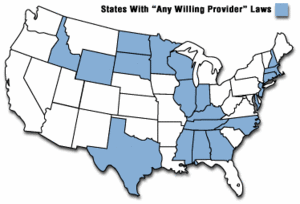AWP laws began to appear in the mid-1990s, in response to complaints that managed care organizations sometimes block people from seeing the doctors of their choice. Although the specifications vary from state to state, generally, AWP laws require HMOs or insurance companies to accept out-of-network health care providers; in return, the provider must agree to the insurer's reimbursement rates and contract terms.
Currently, 20 states have AWP laws on the books. Kentucky has two statutes that prohibit health insurers from "discriminating against any (health care) provider ... willing to meet the terms and conditions for participation established by the insurer." The laws also require any health benefit plan that includes "chiropractic benefits" to permit any licensed chiropractor who agrees to abide by the plan's terms "to serve as a participating primary chiropractic provider."
The dispute began in 1997 when a group of HMOs, led by the Kentucky Association of Health Plans, filed suit in federal district court against the state's insurance commissioner. The HMOs operated exclusive "provider networks" with selected doctors, hospitals and other health care providers, and contended that Kentucky's laws were pre-empted by the Employee Retirement Income Security Act. ERISA is a federal bill that pre-empts all state laws "insofar as they may now or hereafter relate to any employee benefit plan." However, state laws that "regulate insurance" are expressly exempt from ERISA.
The district court judge ruled that each of the Kentucky laws "regulates insurance" and were therefore saved from ERISA pre-emption. In 2000, a federal appeals court upheld the district court's ruling and said that Kentucky's AWP laws regulate insurance "as a matter of common sense," because they are "specifically directed toward 'insurers' and the insurance industry." The HMOs appealed that decision, and the Supreme Court was given the challenge of deciding whether Kentucky's AWP laws applied to benefits or insurance.

The HMOs claimed that Kentucky's laws fell outside the scope of ERISA pre-emption on two points: that the state "failed to 'specifically direct' its AWP laws towards the insurance industry"; and that the laws "do not regulate an insurance practice." The Court disagreed with the HMOs' argument, and in a unanimous decision, said, "We find neither contention persuasive."
"We do not think it follows that Kentucky has failed to specifically direct its AWP laws at the insurance industry," wrote Justice Antonin Scalia in giving the Court's decision. "Neither of Kentucky's AWP statutes, by its terms, imposes any prohibitions or requirements on health-care providers."
"For a state law to be deemed a 'law ... which regulates insurance'" under ERISA, Judge Scalia added, "it must satisfy two requirements. First, the state law must be specifically directed toward entities engaged in insurance. ... Second, as explained above, the state law must substantially affect the risk pooling arrangement between the insurer and the insured. Kentucky's law satisfied each of these requirements."
The Supreme Court decision will affect doctors of chiropractic in various states differently. Because Kentucky's AWP laws were specifically found to be exempt from the ERISA laws, DCs in Kentucky maintain the rights of those AWP laws. Doctors in states that also have specific AWP laws will most likely continue to enjoy admission to the HMOs operating in their states.
However, many states don't yet have an AWP law that would take advantage of the new ruling. DCs and chiropractic state associations will want to consider this new ruling carefully and weigh the benefits of introducing AWP legislation.
References
- Kirkland M. Court upholds "any willing provider" laws. United Press International, April 2, 2003.
- Holland G. Court: HMOs can be made to open networks. Associated Press, April 2, 2003.
- Kentucky Association of Health Plans, Inc., et al. v. Miller, Commissioner, Kentucky Department of Insurance. Case No. 00-1471. Argued Jan. 14, 2003; decided April 2, 2003.
Dynamic Chiropractic editorial staff members research, investigate and write articles for the publication on an ongoing basis. To contact the Editorial Department or submit an article of your own for consideration, email
.




